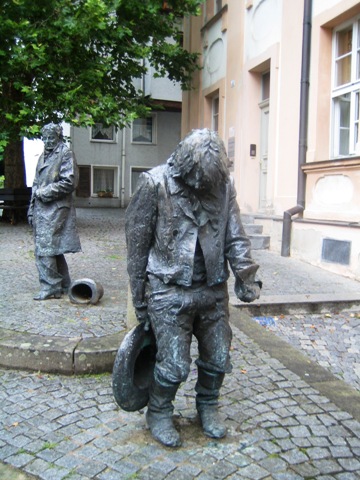Against the Coldness of the Heart - Jakob Wassermann
Christoph WernerJakob Wassermann (1873-1934) was one of the best-known German writers of the early 20th century, more so than even such well-known authors as Thomas and Heinrich Mann. Largely forgotten in modern times, interest in his work has only recently been rekindled. Who was he?
Jakob Wassermann was born in 1873, the son of a Jewish shopkeeper in Fürth, in northern Bavaria, Germany. He served an apprenticeship as a merchant, but abandoned it, despite the displeasure of his father, in order to pursue his interest in writing. He published literary works in various newspapers and finally was able to earn his living as a freelance writer in Munich, working there for the satirical weekly "Simplicissimus" and becoming acquainted with, among others, Thomas Mann, Rainer Maria Rilke and Hugo von Hofmannsthal.
He achieved his first literary success with his novel "The Jews of Zirndorf" (1897, Die Juden von Zirndorf, English translation: "The Dark Pilgrimage"), describing the longing of the Jews for the Messiah. His fame spread after the publication of his novel "Caspar Hauser or Against the Coldness of the Heart" (1908, Caspar Hauser oder Wider die Trägheit des Herzens). This is a fact-based story of the mysterious foundling Kaspar Hauser, a strange boy, apparently unfamiliar with the ordinary world, who was found in Nuremberg in 1828 and whose identity and subsequent murder or suicide remained a mystery. Wassermann uses the story to castigate bourgeois heartlessness and indifference in dealing with anything out of the ordinary.
In his novel "The Maurizius Case" (1928, Der Fall Maurizius) the author treats the theme of justice with the carefully plotted suspense of a detective story.
Wassermann's autobiography appeared in 1921 under the title "My Life as German and Jew" (Mein Weg als Deutscher und Jude).
The author of this text encountered the writer for the first time when reading the story "The Gold of Caxamalca" (1921, Das Gold von Caxamalca), the last sentence of which has accompanied him all his life:
 In this wonderful story the author develops – contrary to historical reality - an alternative view of the European society of the 16th as well of his, the 19th and 20th centuries. The story was republished in East Berlin in 1957 in a collection titled "German Writers of the 20th Century" where this author read it and understood at once Wassermann’s desperation at the seeming unchangeability of human conduct, which is expressed in the above quotation.
In this wonderful story the author develops – contrary to historical reality - an alternative view of the European society of the 16th as well of his, the 19th and 20th centuries. The story was republished in East Berlin in 1957 in a collection titled "German Writers of the 20th Century" where this author read it and understood at once Wassermann’s desperation at the seeming unchangeability of human conduct, which is expressed in the above quotation.
All his life Jakob Wassermann suffered from real or imagined isolation as a Jew, which might have been partly due to a certain trait of character, as seen in his essay "The Fate of the Jews" (Das Los der Juden):
"The upright Jew, who is sure of himself, has of course never forgotten to feel strange among strangers in a strange land because nothing was granted him out of love. He could never convincingly prove a legal title to his possessions. And so more intimate, more measured and more secret is his love of land and landscape. There have been Jews who because they were ashamed of this love denied and betrayed it in a madness of the heart." („Sich fremd unter Fremden im fremden Land zu fühlen, das hat der aufrichtige und seiner selbst gewisse Jude natürlich nie verlernt, denn mit Liebe ward ihm nichts gewährt. Einen Rechtstitel auf seinen Besitz konnte er, durfte er niemals überzeugend nachweisen. Um so inniger, heimlicher, verhaltener ist oft sein Verhältnis zu Land und Landschaft. Es hat Juden gegeben, die aus Scham über die Liebe in einem Wahnsinn des Herzens zu Leugnern und Verrätern wurden".)
Wassermann was an extraordinary poet with a high moral code, which finds its expression in a fervent as well as highly moral language.
Many of Wassermann's books are available free of charge at Projekt Gutenberg. There one can sample his art on-line before starting to read his books in paper form, which naturally provides greater pleasure.
*****
Quellen:
Wassermann, Jakob. 1923. Das Gold von Caxamalca. In: Deutsche Erzähler des 20. Jahrhunderts. Hg. von Böttcher, Kurt, Krohn, Paul Günter unter Mitarbeit von Berger, Karl Heinz, Band 1, Verlag Neues Leben, Berlin 1957.
Wassermann, Jakob. 1924. Deutsche Charaktere und Begebenheiten. Erste und zweite Reihe. Gesammelt und herausgegeben von Jakob Wassermann. München u. a.: Rikola Verlag.
Hammer, Franz. 1984. Er schrieb gegen die Trägheit des Herzens. Vor fünfzig Jahren starb Jakob Wassermann. Artikel in „Neues Deutschland“ vom Januar 1984.
http://www.jakob-wassermann.de/jw_ueber_ursula_homann.htm
Thomas Mann, Rezension zu Caspar Hauser, zuerst erschienen: Münchner Neueste Nachrichten vom 15. 2. 1908
Entnommen: Mann, Thomas. 2002. Essays 1, 1893-1914. Herausgegeben und textkritisch durchgesehen von Heinrich Detering unter Mitarbeit von Stephan Stachorski. Frankfurt a.M.: S. Fischer Verlag, S. 197-199




